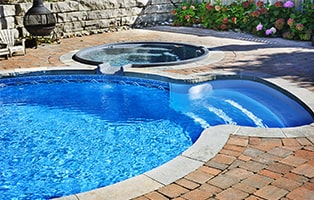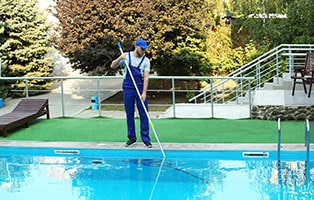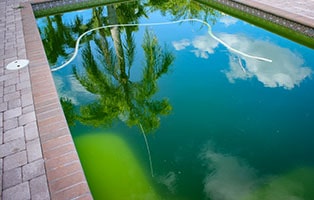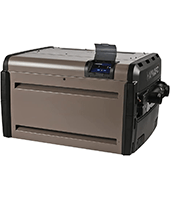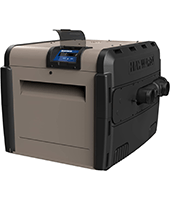 The Top-rated Gas Pool Heaters are here in our 2023 Reviews and Ratings! Read before you Buy.
The Top-rated Gas Pool Heaters are here in our 2023 Reviews and Ratings! Read before you Buy.
What’s fantastic about gas pool heaters running on propane or natural gas is that they allow you to extend the swim season by a couple of months in the spring and fall. This means you’ll have more opportunities to take a refreshing dip—even when it’s starting to get chilly. By using a heater, you might even be able to keep your pool open year-round.
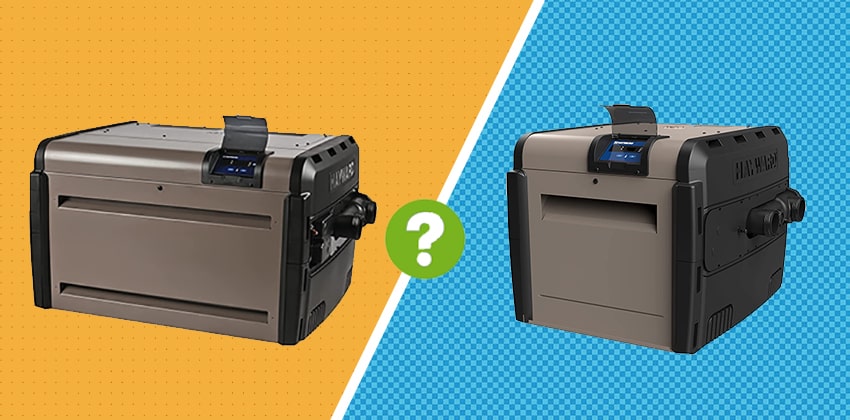
Let’s say you live in a region where the thermometer can drop to bone-chilling levels and own an above-ground or inground pool. In that case, you’ll probably want a gas model. That’s because they work faster than other types—something you’ll appreciate when you’re dying for a swim and your pool water is so cold it’ll numb your toes and other body parts.
Moreover, gas and propane have ultra-low freezing points, which makes them an excellent choice for running heaters in particularly frigid places. This means that while they can ice over, it’s doubtful that would ever occur. For instance, the freezing point of propane is -306 degrees Fahrenheit. Not even Antarctica gets this cold!
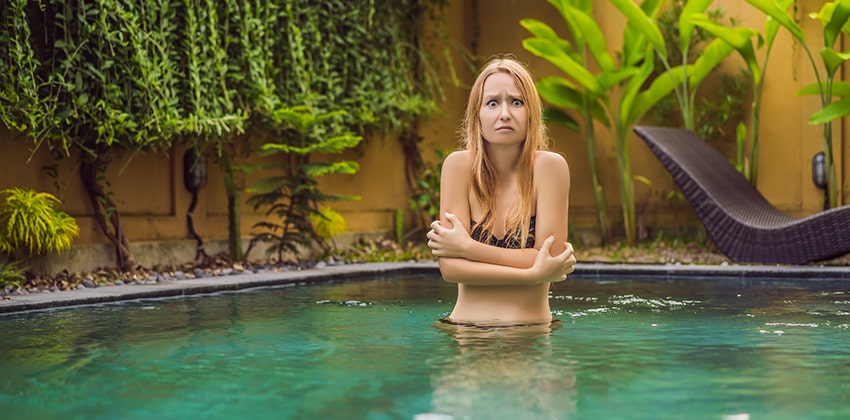
Typically, a gas-powered model can raise water temperature between one and three degrees Fahrenheit per hour. This means you only need to switch on the unit a few short hours before swim time.
Unlike heat pumps, gas heaters don’t depend on outside temperatures needing to be in a particular range to work. However, because they cost more to operate, they’re usually not the best choice if you live in a warmer climate or want to spend less. If you’re looking for other types of pool heaters in 2023, check out our comprehensive guide, including BTU ratings.
How Do Gas Pool Heaters Work?
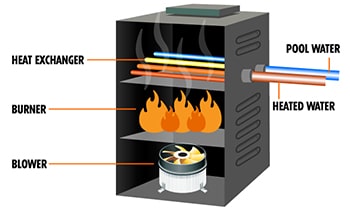
Whether fueled by natural gas or propane, gas pool heaters work in essentially the same way. The pool pump starts the process by sucking water out of the pool. The water then flows through copper tubes, where it’s warmed to a comfortable temperature over flames.
Winterizing Your Gas Pool Heater
No matter which type of heater you purchase, you’ll need to winterize it at the end of swim season. That way, you’ll ensure it can withstand freezing temperatures so that brackets, filters, and other parts won’t get damaged.
To winterize your heater, turn off the gas using the gas line valves. Then, switch off the heater. Open the pressure switch, and open and remove all drain plugs. Store these components in a safe place.
Disconnect the hoses and the power source. Lastly, blow out the heater with a shop vacuum to remove all water.
Our Choice For The Top-Rated Propane Pool Heater is the Hayward W3H250FDP Universal
We select, test, review and suggest the best products. We may earn a commission, if you buy something through our links.
Propane Pool Heaters Pros and Cons

Propane is a clean fuel source with low carbon content and few harmful emissions. It’s typically stored in tanks in its liquid form. These tanks can be installed virtually anywhere, even where it’s impossible to run gas pipelines. However, propane tanks need to be refilled by a delivery truck, so a customer could run out if they don’t keep an eye on the tank level.
Burning one cubic foot of natural gas generates 1,030 BTUs, while burning one cubic foot of propane gives off 2,516 BTUs. Therefore, you’ll get 2.5 more energy from propane than from natural gas.
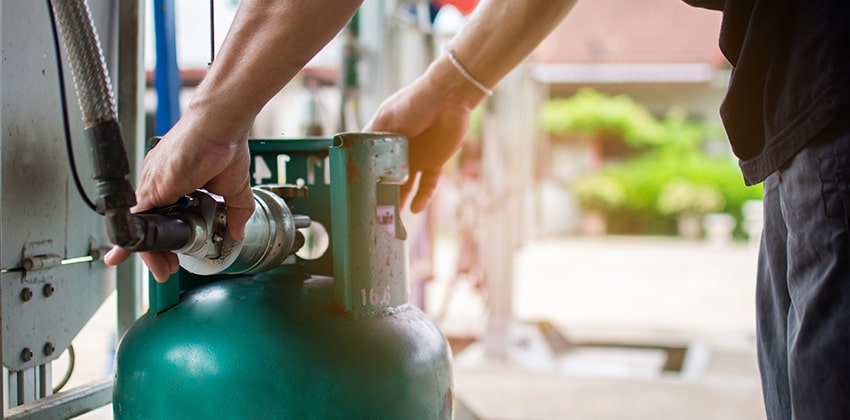
If you already use propane as a home heating source, you have the fuel needed to operate a propane pool heater. Since propane swimming pool heaters for above ground pools use a lot of fuel, it’s essential to have the right size tank. Call your propane company to see if your existing tank is sufficient.

If you currently don’t use propane to heat your house, have a propane company install a tank. How big your pool determines how much propane you need to heat it. You’ll want a tank big enough to meet this demand.
You’ll need a tank considerably larger than the standard 4.5-gallon size people use for backyard barbecues. Because this usually means one that’s 120 gallons or more, ensure you have plenty of space in your backyard.
Some think that above-ground propane tanks take up too much space or look unsightly. If you feel this way, you can install an underground propane tank that will not only save on yard space but also be hidden away. Underground tanks are safer because leaks remain underground, and the tank is less susceptible to temperature changes.
Our Choice For The Top-Rated Natural Gas Pool Heater is the Hayward W3H250FDN Universal
Natural Gas Pool Heaters Pros and Cons

People use both propane and natural gas for cooking and heating their homes. One of the most significant differences is how these fuels are moved from local gas utilities to a customer’s home.
Natural gas gets there via always-connected pipelines. This means that consumers can get it automatically around the clock and never have to worry about running out (unlike propane).
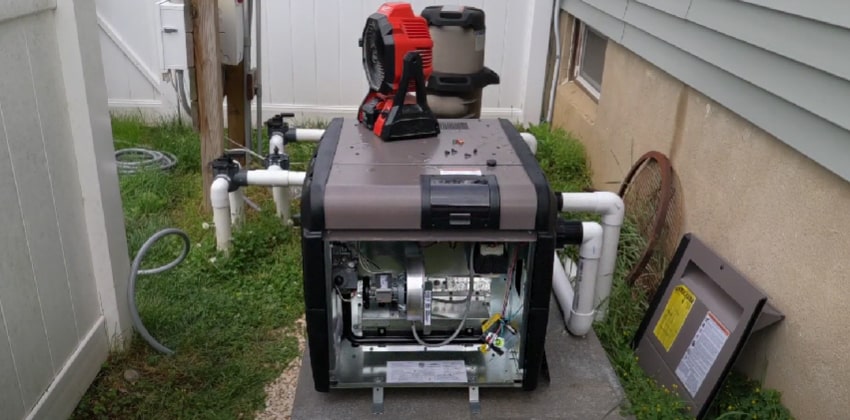
The initial purchase cost of gas pool heaters for inground pools is about the same whether they run on propane or natural gas. Typically, it costs between $1,500 and $6,000 and an additional $500 to $1,500 for labor.
While purchase and installation costs are similar for natural gas and propane heaters, natural gas pool heaters are usually cheaper to operate. This is true if the price of natural gas is 40% of the cost of propane (which it typically is). Pool heaters typically cost $200 to $400 per month to run if using natural gas and $200 to $850 per month with propane.

You’ll need a qualified plumber to install water lines connecting a natural gas swimming pool heater to your pool. This will cost between $350 and $1,900. If you’re using a pre-existing hookup, you’ll pay $500 to $1,500 less.
How to Choose A Propane or Natural Gas Pool Heater
Pool Size
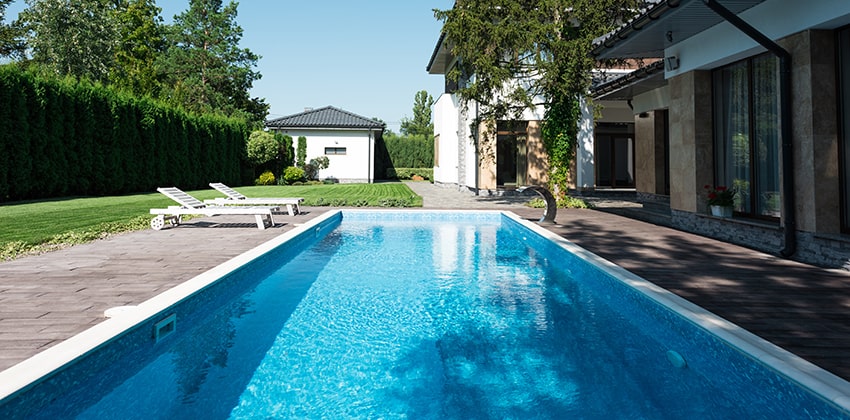
Pool size is one of the most crucial factors when figuring out when choosing a gas pool heater for inground and above ground pools. The bigger the pool, the more power your heater will need. Buying a unit with an insufficient BTU rating could mean waiting all day for the pool to heat up when you’re dying to take a relaxing swim.
British Thermal Units (BTUs)
When comparing propane and natural gas heaters, it’s helpful to figure out how much energy we can extract from the same amount of each. To do this, we use British Thermal Units (BTUs).
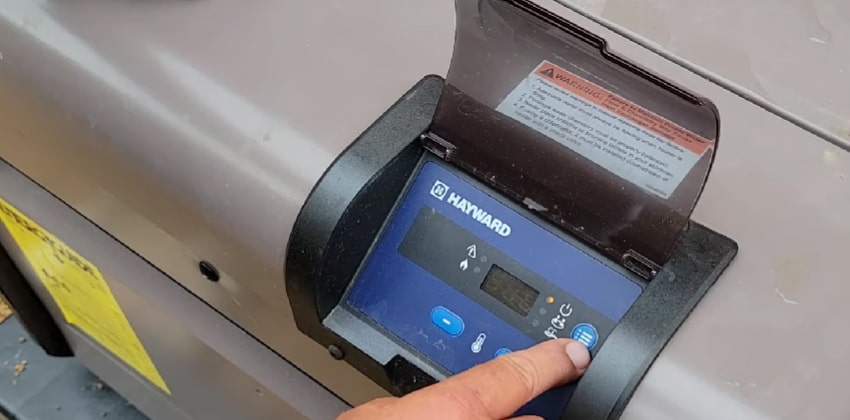
A BTU is the heat amount needing to be absorbed by one pound of water to elevate its temperature by a single degree Fahrenheit at the temperature at which H2O is most dense (approximately 39 degrees Fahrenheit).
The bigger your pool, the more BTUs you’ll need your heater to generate. A rough guide is for every 10,000 gallons of water, you’ll need 100,000 BTUs of heater output.
Pools up to 13,000 gallons can usually get by with models that generate BTUs of 50,000 or less. However, they usually don’t make gas pool heaters rated below 75,000 BTUs.
Heater Efficiency
Gas pool heaters are rated on their efficiency, which is the ratio of usable output to total output. For instance, an 80% efficient unit uses $80 worth of usable heat for every $100 of fuel it burns.
You can find the efficiency rating on the nameplate. Try to get a model that’s 89 to 95% efficient. If you’re thinking about buying a gas pool heater with greater efficiency than what you currently have, use the following formula to estimate what you’ll save:
- CURRENT ANNUAL HEATER EXPENSE x [1 – (CURRENT EFFICIENCY ÷ NEW EFFICIENCY)] = SAVINGS
- $3,000 x [1 – (89 ÷ 95)]
- $3,000 x [1 – 0.94]
- $3,000 x 0.06 = $180
For instance, let’s say you’re replacing an 89% rated unit with one rated at 95%. Here’s the calculation:
This means you’ll save $180 a year by purchasing a unit with this rating.
Durability
Make sure whichever model you buy has a durable casing which not only keeps heat in but also protects mechanical components from corrosion damage and wild temperature fluctuations. The better insulated your unit is, the more efficiently it can maintain water temperature.
Emissions
California recently implemented low nitrogen oxide (NOx) emission standards for certain kinds of machinery, including gas pool heaters. Because more states are adopting these measures, consider getting a model that adheres to these protocols.
How to Find Out How Many BTUs You’ll Need
Step One: Calculate Pool Volume
As we already mentioned, pool size is one of the most crucial factors when deciding which size heater to get. If you don’t consider this factor, you could make the mistake of buying a heater with an insufficient BTU rating. This could result in wasting a lot of energy for not much of a temperature boost.
Start by calculating pool volume using this formula:
AVERAGE LENGTH x AVERAGE WIDTH x AVERAGE DEPTH x 7.5 = VOLUME (GALLONS)
Step Two: Figure Out Ideal Water Temperature
This is the temperature that feels most comfortable to you while you’re swimming.
Step Three: Determine Coldest Ambient Air Temperature
This is the lowest temperature for the coldest month you’ll use your pool.
Step Four: Consider All Variables
Before making a final decision, consider all the other variables that affect pool heater efficiency. They include:
- pool surface area
- whether you use a solar cover
- the climate in your area of the country
- heat, wind, and rain exposure
- how frequently you use your pool
A Real-World Example

- BTU CONSTANT = ONE POUND OF WATER HEATED TO ONE DEGREE FAHRENHEIT
- WATER CONSTANT = 8.3 POUNDS OF WATER PER GALLON
- 30,000 x 8.3 POUNDS PER GALLON = 249,000 POUNDS OF WATER NEEDING TO BE HEATED
Raising the pool temperature by one degree will take 249,000 BTUs of heat energy. To increase the temperature by nine degrees, it’ll require 2,241,000 BTUs.
Next, determine how long you want it to take for the water to heat up. Let’s say it’s 24 hours.
To determine BTUs required per hour, divide 2,241,000 by 24, which is 93,375. This means you would need a heater rated at 93,375 BTUs to arrive at your ideal temperature within the specified time frame.
Figuring Out Heating Time Based on BTU Output
If you have already have a heater with a BTU rating and want to know how long it’ll take to heat your pool, use this formula:
GALLONS OF WATER x WEIGHT PER GALLON (8.33 POUNDS) x DEGREE OF TEMPERATURE INCREASE / BTU OUTPUT OF HEATER
For example, here’s how long it takes to raise the temperature in a 10,000-gallon pool by 15 degrees with a 125,000 BTU heater:
- 10,000 x 8.33 = 83,300
- 83,300 x 15 = 1,249,500 BTUs needed to heat water 15 degrees
- 1,249,500 / 125,000 = 9.996 hours
Tips on Gas Pool Heater Installation

Install your gas pool heater in a dry and sunny place, away from shrubbery, overhanging trees, and leaky downspouts. You should never place them indoors unless the unit is specifically designed for indoor use.
Gas heaters typically require a 5’ x 5’ space for exhaust, ventilation, and service access. For safety reasons, you’ll want to put your gas-powered heater on a non-combustible surface or mat.
When selecting a location for your unit, determine how much clearance you need above and to the side. You can find this information in the manual. Situate the heater as close as possible to the filter—ideally within two to five feet. That way, you’ll save yourself some work by not having to install extra piping.
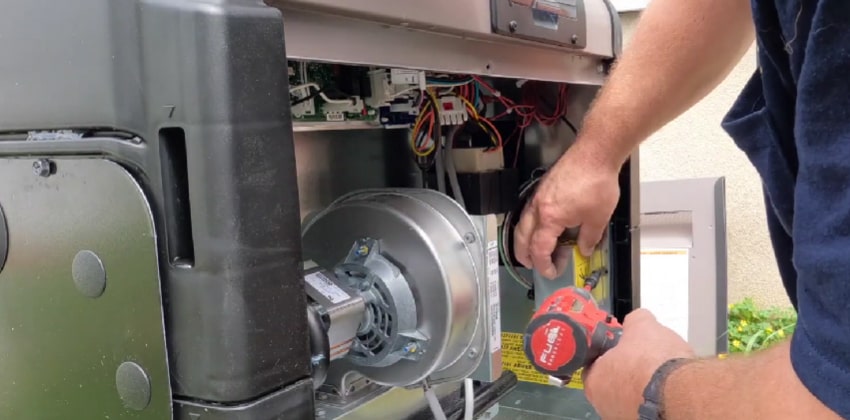
Turn the filter off before installing the heater. Measure the distance from the filter return valve to the heater inlet valve. Cut the PVC pipe to this length and use it to connect both valves.
Measure and cut another PVC pipe piece and run it from the heater outlet valve to the water inlet. Use a plumbing compound to secure the pipes and joints tightly.
Check with your local building inspector before hooking gas lines to the unit. That’s because most municipalities require qualified professionals to do this.
If this isn’t necessary, install a shut-off valve at the end of the gas pipe. Run a flex gas line from there to the heater inlet. Connect the 120-volt plug of your heater to an electrical outlet. Install an outlet covering to protect it from the elements. Plug the unit in.
Now, it’s time to test the setup. Turn the pool filter and heater on and slightly raise the thermostat temperature. A fan will blow before the heater ignites. Make sure that when it does, there’s a blue flame. If everything is working, you’re finished with the installation, and you can now use your heater.
Gas Pool Heaters
Electric Pool Heaters
A longer heating time means it could take days to heat up a bigger pool. Because electric pool heaters need to run longer, the cost of running one is usually higher than natural gas or propane models.This means that if you only use your pool occasionally, a gas heater might be the better choice.
Gas heaters work even if the electricity goes out. However, if there’s not a pre-existing gas line nearby, it can be expensive to install one.
One advantage electric heaters have over their gas-powered counterparts is that electricity is usually the most readily available pool heating source. You can unplug these units and store them away for the winter when swim season is over. They’re typically quieter than gas—powered ones too.

Pool Maintenance Tips & Tricks
